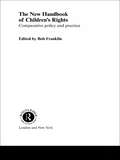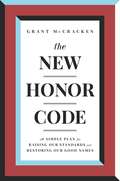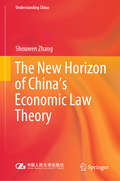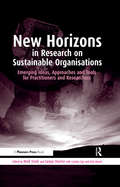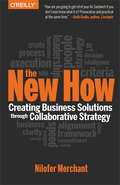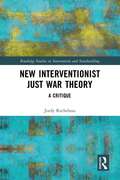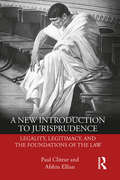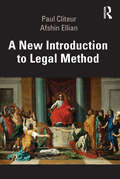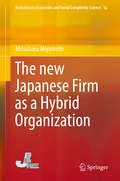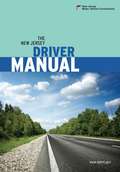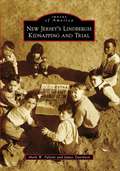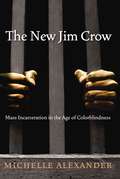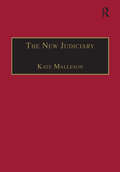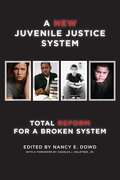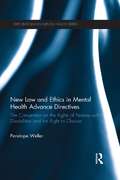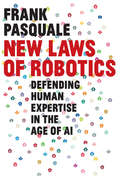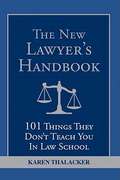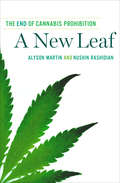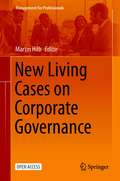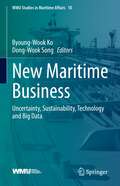- Table View
- List View
The New Handbook of Children's Rights: Comparative Policy and Practice
by Bob FranklinThe new edition of this well established handbook provides up-to-date information on a topic of increasing importance across a range of disciplines and practices. It covers:* the debate concerning children's rights and developments in rights provision over the last twenty years* the impact of recent British legislation on children's rights in key a
New Histories of American Law: Making Foreigners
by Kunal M. ParkerThis book reconceptualizes the history of US immigration and citizenship law from the colonial period to the beginning of the twenty-first century by joining the histories of immigrants to those of Native Americans, African Americans, women, Asian Americans, Latino/a Americans and the poor. Parker argues that during the earliest stages of American history, being legally constructed as a foreigner, along with being subjected to restrictions on presence and movement, was not confined to those who sought to enter the country from the outside, but was also used against those on the inside. Insiders thus shared important legal disabilities with outsiders. It is only over the course of four centuries, with the spread of formal and substantive citizenship among the domestic population, a hardening distinction between citizen and alien, and the rise of a powerful centralized state, that the uniquely disabled legal subject we recognize today as the immigrant has emerged.
The New Honor Code: A Simple Plan for Raising Our Standards and Restoring Our Good Names
by Grant McCrackenCultural anthropologist and thought leader Grant McCracken proposes a radical solution for our time of unprecedented scandal: a return to honor. What used to be shocking has somehow become the new normal in our politics, workplaces, and universities. Sexual predators stalk interns at work and teenagers abroad. Parents try to buy a place for their kids in college. Pharmaceutical companies refuse to acknowledge the Opioid epidemic they helped create. Banks issue credit cards no one ordered, ruining the credit scores and reputations of thousands. It happens so frequently that we can no longer dismiss these cases as a few bad apples. Clearly, something in the system is rotten. Most Americans are committed to morality. We share basic standards of decency. And yet, we&’re becoming inured to scandal and shame, and hopeless about the possibility of change. What if we decided to fight it instead? Grant McCracken has a solution—the revival of an ancient idea called honor. Once the moral compass of millions of people for hundreds of years, it has since fallen out of currency just when we need it the most. Grant looks at honor and dishonor as these are expressed in popular culture and at institutions as diverse as Harvard, PBS, and Wells Fargo. He offers practical guidelines for both organizations and individuals looking to restore moral order to their lives.
The New Horizon of China's Economic Law Theory (Understanding China)
by Shouwen ZhangThis book presents the development and reformation of economic law in China and explores the "three relationships" between the government and market, between reform and rule of law, and between the constitution and economic law. On this basis, it subsequently focuses on development theory, distribution theory, risk theory and crisis theory. Further, it addresses effective development, fair distribution, and prevention and resolution of related risks and crises, which are important functions of economic law. In order to achieve the above functions and objectives, the book argues, we must vigorously promote the integration of rule of law in economic law, and constantly refine the theory of economic rule of law employed in China.The book demonstrates that no matter how the "three major relationships" are adjusted or the relevant systems are reformed – i.e., regarding the implementation of the concept of coordinated development or the optimization of economic structures; the solution of distribution problems or the improvement of distribution systems; the prevention of risks or the response to crises – any such changes depend on economic rule of law. The above-mentioned theoretical discussion presents a "new horizon" of contemporary Chinese economic law theory, which will be of great value to the future development of economic law theory.
New Horizons in Research on Sustainable Organisations: Emerging Ideas, Approaches and Tools for Practitioners and Researchers
by Mark Starik Sanjay Sharma Carolyn Egri Rick BunchEnvironmental sustainability practice and research have advanced over the past decade from novelty to near-mainstream status today. During this environmentally critical time period, sustainability practitioner techniques, such as environmental, energy and social auditing, other sustainability information and related systems, and a wide variety of environmental sustainability approaches have been developed, improved and institutionalised, advancing both the practice and research of environmental sustainability management and policy. However, academics and practitioners in the sustainability field still have widely differing perspectives on what a sustainable organisation is or might be, but seldom take the opportunity to share these respective sustainability visions, let alone the multiple ways to achieve them. New Horizons in Research on Sustainable Organisations is intended to bridge this gap between academics and practitioners with cutting-edge research from both groups on progress towards sustainability. After working on sustainability-related projects involving other academics, both research- and practitioner-oriented graduate students, consultants, managers and activists, the lead co-editors of this volume saw the need to encourage information exchanges among differing networks of sustainability stakeholders to create a pathway for researchers and practitioners in the general area of organisations and the natural environment to address issues of common interest. There are many networks in the general subject area, but the cross-pollination of ideas between academics and practitioners remains sketchy. New Horizons in Research on Sustainable Organisations is intended to present and encourage such cross-pollination. The chapters in this volume are presented in three subsets, generally proceeding from the most "macro" to the most "micro" in terms of perspective and applicability. However, this arbitrary division belies the integration from macro through meso (or mid-range) to micro levels that is apparent in these studies. Macro approaches typically include wider geographic scopes, greater numbers of stakeholders, and more complex explanatory factors than micro approaches. Each chapter adopts one or more particular sustainability world-view and then grounds these and the other chapter elements within actual organisations. Therefore, the reader is advised to envision not a one-dimensional continuum but rather a circle in which the macro view both feeds back and feeds forward to the micro view. This volume addresses a number of intriguing and important sustainable organisation phenomena such as multiple sustainable development perspectives, changing environmental politics, environmental management systems variations, voluntary environmental programme performance, complex adaptive systems, and environmental technology development. Additionally, several models are suggested, such as cultivation, capabilities and business ecology frameworks.
The New How [Paperback]: Creating Business Solutions Through Collaborative Strategy
by Nilofer MerchantWhat people are saying about The New How "How are you going to get rid of your Air Sandwich if you don't even know what it is? Provocative and practical at the same time."--Seth Godin, author of Linchpin" The New How is informative and provides exciting insights because the suggestions are practical and doable. Merchant gets the new reality--leadership fails not so much from flawed strategy as it does from failed processes of engagement from those responsible for implementing the strategy. In high-performing organizations, everyone acts like a leader, and they own the strategy and take actions to ensure its success. If you care about making a difference, read this book."--Barry Posner, author of The Leadership Challenge"Collaboration is a powerful, competitive weapon: this book shows you how to use it to win markets."--Mark Interrante, VP Content Products, Yahoo, Inc."In a world in which the pace of change is ever quickening, collaboration, not control, is the route to a successful organization. This book tells you how to make your organization collaborative. And Nilofer Merchant's writing is a model of clarity."--Barry Schwartz, author of The Paradox of Choice: Why More Is Less"Want to transform your organization into a collaborative enterprise? Nilofer Merchant provides insightful and practical strategies in The New How."--Padmasree Warrior, CTO, Cisco Systems, Inc."Merchant's book is a practical guide for the journey from strategy to implementation. The collaborative tools described here can help companies reach strategic success--and avoid pitfalls along the way."--Tom Kelley, General Manager, IDEO, and author of Ten Faces of InnovationOnce in a generation, a book comes along that transforms the business landscape. For today's business leaders, The New How redefines the way companies create strategies and win new markets.Management gurus have always said "people matter." But those same gurus still relegate strategy to an elite set of executives who focus on frameworks, long presentations, and hierarchical approaches. Business strategy typically has been planned by corporate chiefs in annual meetings, and then dictated to managers to carry out. The New How turns that notion on its head. After many years of working with Apple, Adobe, HP, and many other companies, Nilofer Merchant discovered the secret sauce: the best way to create a winning strategy is to include employees at all levels, helping to create strategy they not only believe in, but are also equipped to implement.In The New How, Nilofer shows today's corporate directors, executives, and managers how they can transform their traditional, top-down approach to strategy planning and execution into collaborative "stratecution" that has proven to be significantly more effective. Enhance performance and outcomes by deflating the "air sandwich" between executives in the boardroom and employees Recognize that strategy and execution are thoroughly intertwined Understand how successful strategy is founded in effective idea selection-a pile of good ideas doesn't necessarily build good strategy Create company strategy and link it to targeted execution, using the practical models and techniques provided
New Interventionist Just War Theory: A Critique (Routledge Studies in Intervention and Statebuilding)
by Jordy RocheleauThis book offers a systematic critique of recent interventionist just war theories, which have made the recourse to force easier to justify. The work argues that these theories, including neo-traditionalist prerogatives to national leaders and a cosmopolitan human rights paradigm, offer criteria for war that are insufficient in principle and dangerous in practice. Drawing on a plurality of moral considerations, the book recommends a modified legalist national defense paradigm, which includes an atrocity threshold for humanitarian intervention and a legitimate authorization requirement. The plausibility of this restrictive framework is applied to case studies, including the long wars in Iraq and Afghanistan, ongoing targeted killing, and possible interventions in Syria and elsewhere. Various arguments which seek to loosen the criteria for war are also systematically analyzed and criticized. This book will be of much interest to students of just war theory, military history, ethics, political philosophy, and international relations.
A New Introduction to Jurisprudence: Legality, Legitimacy and the Foundations of the Law
by Paul Cliteur Afshin EllianA New Introduction to Jurisprudence takes one of the central problems of law and jurisprudence as its point of departure: what is the law? Adopting an intermediate position between legal positivism and natural law, this book reflects on the concept of ‘liberal democracy’ or ‘constitutional democracy’. In five chapters the book analyses: (i) the idea of higher law, (ii) liberal democracy as a legitimate model for the state, (iii) the separation of church and state or secularism as essential for the democratic state, (iv) the universality of higher law principles, (v) the history of modern political thought. This interdisciplinary approach to jurisprudence is relevant for legal scholars, philosophers, political theorists, public intellectuals, historians, and politicians.
A New Introduction to Legal Method
by Paul Cliteur Afshin EllianA New Introduction to Legal Method provides a comprehensive overview of legal science and the scientific character of legal knowledge. In five chapters, the book analyses and explores: (i) legal methodology in general, the main features of different schools of thought, and the nature of science in general; (ii) American realism, which offers an ideal starting point for law students to reflect on the material they are about to study critically; (iii) rationalism, empiricism, and logical positivism, in particular the work of Karl Popper; (iv) criticisms of essentialism; (v) the ideological and philosophical background of contemporary liberal interpretation. The inclusion of Dutch, French, and German literature sources makes this law title differ from previous writings on legal science. This textbook is ideal for students of legal method, and will be of great interest to those studying legal science, jurisprudence, legal research,and legal skills.
The new Japanese Firm as a Hybrid Organization (Evolutionary Economics And Social Complexity Science Ser. #16)
by Mitsuharu MiyamotoThis book examines corporate reform in Japan by focusing on corporate governance and the employment system. Contrary to a prevailing assertion of radical change, it is revealed that actual change is gradual, and a new type of Japanese firm is generated by reform with gradual change. Throughout the book, Japanese firms are seen to be evolving through gradual institutional change. Chapter 1 discusses how Japanese corporate governance changed incrementally and cumulatively to rebuild management and restore corporate performance. Chapter 2 focuses on reform in work organization and discusses how performance-related pay was introduced in tandem with corporate governance reform. It is shown that the practice of long-term employment has been maintained despite the prolonged depression and mounting pressure to shift to shareholder-oriented corporate governance. Chapter 3 investigates how Japanese firms are diversified into four types, based on whether performance-related pay is introduced and whether long-term employment is maintained. The author demonstrates that major Japanese firms reconstruct their organization as hybrid structures based on a combination of long-term employment and performance-related pay. Chapter 4 investigates how performance-related pay actually operates. It is analyzed by distinguishing the three main objectives to be attained by performance pay: succeeding in individual performance, contributing to overall organization performance, and meeting the challenge of new tasks. Finally, Chapter 5 investigates how employees react to changes in corporate governance. Using survey data, the book shows that Japanese employees approve of increasing shareholder value, regarding it as corporate value. They not only approve the monitoring of management by shareholders, but also demand a part in the monitoring. Employees seek to be engaged in corporate governance—a true challenge for a Japanese corporation.
The New Jersey Driver Manual 2017
by New Jersey Motor Vehicle CommissionThe New Jersey Driver Manual by the New Jersey Motor Vehicle Commission
New Jersey's Lindbergh Kidnapping and Trial (Images of America)
by James Davidson Mark W. FalziniThe kidnapping and murder of Charles Lindbergh Jr. and the subsequent arrest, trial, and execution of Bruno Richard Hauptmann have intrigued true crime buffs for decades. New Jersey's Lindbergh Kidnapping and Trial tells the story of "the case that never dies" through vintage photographs. Rare photographs, many not seen since the 1930s, will allow the reader to experience the massive police investigation led by New Jersey State Police superintendent H. Norman Schwarzkopf and the circus-like trial and execution of Bruno Richard Hauptmann.
The New Jim Crow: Mass Incarceration in the Age of Colorblindness
by Michelle AlexanderAs the United States celebrates the nation's "triumph over race" with the election of Barack Obama, the majority of young black men in major American cities are locked behind bars or have been labeled felons for life. Although Jim Crow laws have been wiped off the books, an astounding percentage of the African American community remains trapped in a subordinate status--much like their grandparents before them.In this incisive critique, former litigator-turned-legal-scholar Michelle Alexander provocatively argues that we have not ended racial caste in America: we have simply redesigned it. Alexander shows that, by targeting black men and decimating communities of color, the U.S. criminal justice system functions as a contemporary system of racial control, even as it formally adheres to the principle of color blindness. The New Jim Crow challenges the civil rights community--and all of us--to place mass incarceration at the forefront of a new movement for racial justice in America.
The New Jim Crow: Mass Incarceration in the Age of Colorblindness
by Michelle AlexanderSeldom does a book have the impact of Michelle Alexander’s The New Jim Crow. Since it was first published in 2010, it has been cited in judicial decisions and has been adopted in campus-wide and community-wide reads; it helped inspire the creation of the Marshall Project and the new $100 million Art for Justice Fund; it has been the winner of numerous prizes, including the prestigious NAACP Image Award; and it has spent nearly 250 weeks on the New York Times bestseller list. <p><p>Most important of all, it has spawned a whole generation of criminal justice reform activists and organizations motivated by Michelle Alexander’s unforgettable argument that “we have not ended racial caste in America; we have merely redesigned it.” As the Birmingham Newsproclaimed, it is “undoubtedly the most important book published in this century about the U.S.” <p><p>Now, ten years after it was first published, The New Press is proud to issue a tenth-anniversary edition with a new preface by Michelle Alexander that discusses the impact the book has had and the state of the criminal justice reform movement today.
The New Judiciary: The Effects of Expansion and Activism
by Kate MallesonDuring the last thirty years, the judiciary has undergone an unprecedented expansion in its size and power. Judges now have more influence over our private and public lives than ever before. The effect of this change has been to transform the judiciary from an inward-looking elite into an increasingly heterogeneous professional body. 'The New Judiciary' examines the developments which have taken place in the appointment, training and scrutiny of judges as a result of the expanding judicial role. It highlights the increasing tension between the requirements of judicial independence and accountability which these changes are producing. The traditional insulation of the judiciary from all external influences is being challenged by the need for greater openness and public scrutiny of the judicial process. The passing of the Human Rights Act 1998, incorporating the European Convention on Human Rights into domestic law represents another stage in this process by expanding the policy-making role of the senior judiciary still further. As a result, the continuing modernisation of the judiciary, which is the subject of this book, will be a increasingly important feature of the legal and political process in the years ahead.
A New Juvenile Justice System: Total Reform for a Broken System (Families, Law, and Society #6)
by Charles J. Ogletree Jr. Nancy E. DowdA New Juvenile Justice System aims at nothing less than a complete reform of the existing system: not minor change or even significant overhaul, but the replacement of the existing system with a different vision. The authors in this volume--academics, activists, researchers, and those who serve in the existing system--all respond in this collection to the question of what the system should be. Uniformly, they agree that an ideal system should be centered around the principle of child well-being and the goal of helping kids to achieve productive lives as citizens and members of their communities. Rather than the existing system, with its punitive, destructive, undermining effect and uneven application by race and gender, these authors envision a system responsive to the needs of youth as well as to the community's legitimate need for public safety. How, they ask, can the ideals of equality, freedom, liberty, and self-determination transform the system? How can we improve the odds that children who have been labeled as "delinquent" can make successful transitions to adulthood? And how can we create a system that relies on proven, family-focused interventions and creates opportunities for positive youth development? Drawing upon interdisciplinary work as well as on-the-ground programs and experience, the authors sketch out the broad parameters of such a system. Providing the principles, goals, and concrete means to achieve them, this volume imagines using our resources wisely and well to invest in all children and their potential to contribute and thrive in our society.
New Killing Fields: Massacre and the Politics of Intervention
by Nicolaus Mills Kira BrunnerThe question of the responsibility inherent in the unrivaled might of the U.S. military is one that continues to take up headlines across the globe. This award-winning group of reporters and scholars, including, among others, David Rieff, Peter Maass, Philip Gourevitch, William Shawcross, George Packer, Bill Berkeley and Samantha Power revisit four of the worst instances of state-sponsored killing--Cambodia, Yugoslavia, Rwanda, and East Timor--in the last half of the twentieth century in order to reconsider the success and failure of U.S. and U.N. military and humanitarian intervention.Featuring original essays and reporting, The New Killing Fields poses vital questions about the future of peacekeeping in the next century. In addition, theoretical essays by Michael Walzer and Michael Ignatieff frame the issue of intervention in terms of today's post-cold war reality and the future of human rights.
New Law and Ethics in Mental Health Advance Directives: The Convention on the Rights of Persons with Disabilities and the Right to Choose (Explorations in Mental Health)
by Penelope WellerThe recognition of positive rights and the growing impact of human rights principles has recently orchestrated a number of reforms in mental health law, bringing increasing entitlement to an array of health services. In this book, Penelope Weller considers the relationship between human rights and mental health law, and the changing attitudes which have led to the recognition of a right to demand treatment internationally. Weller discusses the ability of those with mental health problems to use advance directives to make a choice about what treatment they receive in the future, should they still be unable to decide for themselves. Focusing on new perspectives offered by the Conventions on the Rights of Persons with Disabilities (CRPD), Weller explores mental health law from a variety of international perspectives including: Canada, Australia, New Zealand and the United Kingdom, where policies differ depending on whether you are in England and Wales, or Scotland. These case studies indicate how human rights perspectives are shifting mental health law from a constricted focus upon treatment refusal, towards a recognition of positive rights. The book covers topics including: refusing treatment new approaches in human rights international perspectives in mental health law the right to demand treatment. The text will appeal to legal and mental health professionals as well as academics studying mental health law, and policy makers.
New Laws of Robotics: Defending Human Expertise In The Age Of Ai
by Frank PasqualeAI is poised to disrupt our work and our lives. We can harness these technologies rather than fall captive to them—but only through wise regulation.Too many CEOs tell a simple story about the future of work: if a machine can do what you do, your job will be automated. They envision everyone from doctors to soldiers rendered superfluous by ever-more-powerful AI. They offer stark alternatives: make robots or be replaced by them.Another story is possible. In virtually every walk of life, robotic systems can make labor more valuable, not less. Frank Pasquale tells the story of nurses, teachers, designers, and others who partner with technologists, rather than meekly serving as data sources for their computerized replacements. This cooperation reveals the kind of technological advance that could bring us all better health care, education, and more, while maintaining meaningful work. These partnerships also show how law and regulation can promote prosperity for all, rather than a zero-sum race of humans against machines.How far should AI be entrusted to assume tasks once performed by humans? What is gained and lost when it does? What is the optimal mix of robotic and human interaction? New Laws of Robotics makes the case that policymakers must not allow corporations or engineers to answer these questions alone. The kind of automation we get—and who it benefits—will depend on myriad small decisions about how to develop AI. Pasquale proposes ways to democratize that decision making, rather than centralize it in unaccountable firms. Sober yet optimistic, New Laws of Robotics offers an inspiring vision of technological progress, in which human capacities and expertise are the irreplaceable center of an inclusive economy.
The New Lawyer's Handbook
by Karen Thalacker101 Success Strategies They Didn't Teach You in Law School - get expert advice on becoming a better lawyer. Law school prepares you to think like a lawyer, write like a lawyer, and research like a lawyer-but once you're in the door of a law firm, there's a whole new set of skills you need. The New Lawyer's Handbook guides you through the 101 essential things you need to know in order to excel. From how to handle your clients and how to work with people in your office, to why it pays to learn to play golf and maintain some semblance of a family life even as you make your billables, The New Lawyer's Handbook gives you the knowledge you need to succeed.
A New Leaf: The End of Cannabis Prohibition
by Nushin Rashidian Alyson MartinIn November 2012, voters in Colorado and Washington passed landmark measures to legalize the production and sale of cannabis for social use-a first not only in the United States but also the world. Medical cannabis is now legal in twenty states and Washington, D.C., and more than one million Americans have turned to it in place of conventional pharmaceuticals. Yet the federal government refuses to acknowledge these broader societal shifts and continues to raid and arrest people: 49.5 percent of all drug-related arrests involve the sale, manufacture, or possession of cannabis. In the first book to explore the new landscape of cannabis in the United States, investigative journalists Alyson Martin and Nushin Rashidian present a deeply researched, insightful story of how recent developments tie into cannabis's complex history and thorny politics. Reporting from nearly every state with a medical cannabis law, Martin and Rashidian enliven their book with in-depth interviews with patients, growers, doctors, entrepreneurs, politicians, activists, and regulators. They whisk readers from the federal cannabis farm at the University of Mississippi to the headquarters of the ACLU to Oregon's "World Famous Cannabis Café." They present an expert analysis of how recent milestones toward legalization will affect the war on drugs both domestically and internationally. The result is an unprecedented and lucid account of how legalization is manifesting itself in the lives of millions. A New Leaf offers an essential guide for anyone who wants to understand the far-ranging implications of this rapidly changing drug landscape.
The New Legal Realism, Volume I: Translating Law-and-Society for Today's Legal Practice
by Elizabeth Mertz Stewart Macaulay Thomas W. MitchellThis is the first of two volumes announcing the emergence of the new legal realism as a field of study. At a time when the legal academy is turning to social science for new approaches, these volumes chart a new course for interdisciplinary research by synthesizing law on the ground, empirical research, and theory. Volume 1 lays the groundwork for this novel and comprehensive approach with an innovative mix of theoretical, historical, pedagogical, and empirical perspectives. Their empirical work covers such wide-ranging topics as the financial crisis, intellectual property battles, the legal disenfranchisement of African-American landowners, and gender and racial prejudice on law school faculties. The methodological blueprint offered here will be essential for anyone interested in the future of law-and-society. Demonstrates the importance of interdisciplinary translation between law and social sciences Introduces readers to the scholarship of today's leading new legal realists. Shows how new legal realism can provide a broader lens than the empirical legal studies movement.
The New Legal Realism, Volume II: Studying Law Globally
by Heinz Klug Sally Engle MerryThis is the second of two volumes announcing the emergence of the new legal realism. At a time when the legal academy is turning to social science for new approaches, these volumes chart a new course for interdisciplinary research by synthesizing law on the ground, empirical research, and theory. Volume 2 explores the integration of global perspectives and information into our understanding of law. Increasingly, local experiences of law are informed by broader interactions of national, international, and global law. Lawyers, judges, and other legal actors often have to respond to these broader contexts, while those pursuing justice in various global contexts must wrestle with the specific problems of translation that emerge when different concepts of law and local circumstances interact. Using empirical research, the authors in this path-breaking volume shed light on current developments in law at a global level. Demonstrates the importance of interdisciplinary translation between law and social sciences Introduces readers to the scholarship of today's leading new legal realists. Shows how new legal realism can provide a broader lens than the empirical legal studies movement.
New Living Cases on Corporate Governance (Management for Professionals)
by Martin HilbThis unique open access book features a selection of Living Cases on Corporate Governance, which were developed and compiled by chairpersons, members of the board of directors, and CEOs in various countries, working in close collaboration with prominent researchers. Each Living Case addresses a current issue that a given company or institution needs to resolve. For every Case, the goal is formulated by the researcher, in consultation with the client. The participants of internal or external board seminars, or university students, then work in teams to analyze the problem, develop an innovative and feasible solution, and summarize the most important lessons learned.
New Maritime Business: Uncertainty, Sustainability, Technology and Big Data (WMU Studies in Maritime Affairs #10)
by Byoung-Wook Ko Dong-Wook SongThis book provides a response to the unexpected challenges imposed on every aspect of today’s maritime business. All chapters of this book are concerned with the single challenge facing the maritime business world – that is, uncertainty. Each chapter deals with a specific area of the maritime business community in an effort to better understand the complicated markets, to seek for a solution of economic or financial sustainability under the pressure of climate changes, to discuss technology as an option for the future, and finally to show how to utilise the big data set for better informed decision- and policymaking that used to be unfeasible in terms of scale and capacity. It is hoped that all those endeavours are considered as the first small step towards practically transforming the industry in line with Schumpeter (1943) as well as academically changing a paradigm of thinking and scientific discovery in line with Kuhn (2012), so that the maritime industry is better informed and prepared, and can greatly contributing to human lives.
